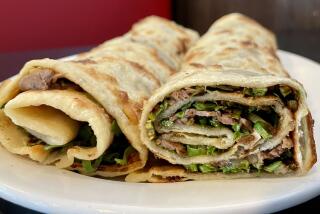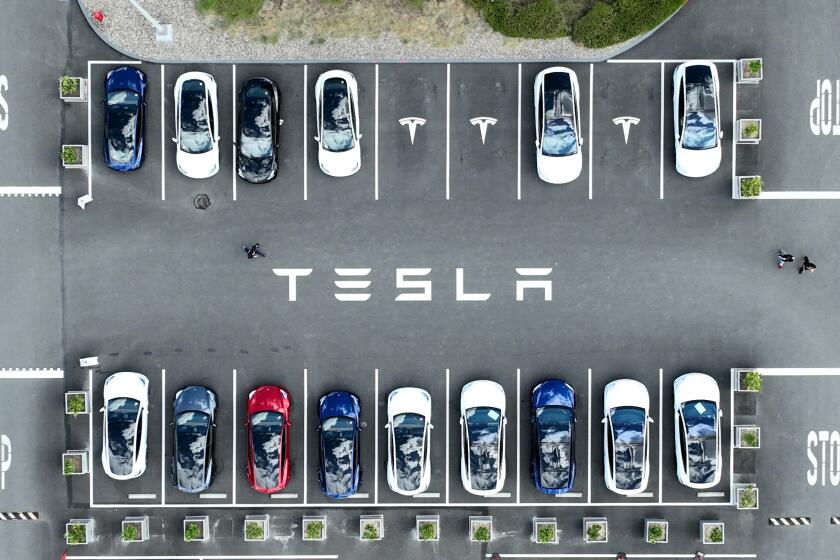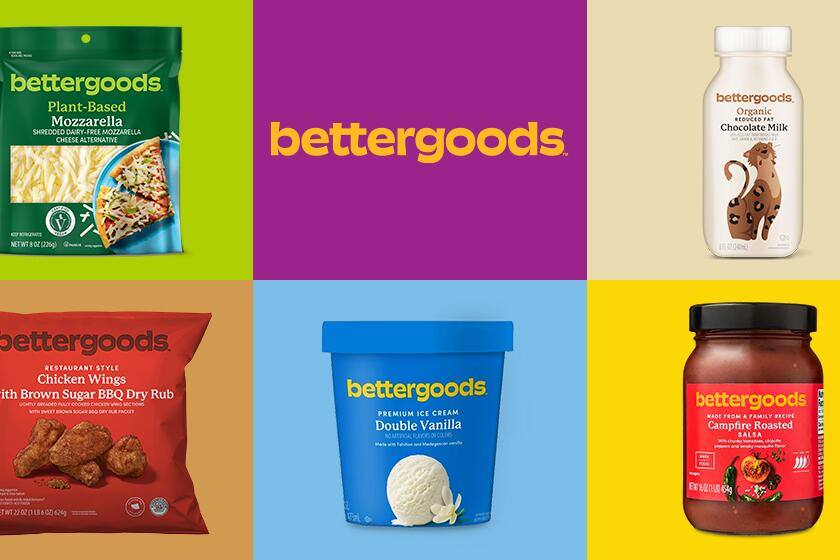Southland hot dog and sausage makers cook up ways to prosper
A faint meaty aroma drifts through parts of the Vernon industrial district south of downtown Los Angeles, hinting at a seldom-discussed facet of the Southland persona: Frankly, we’re the wurst.
Although obscured by the giant meat-packing industry in the nation’s heartland, Southern California is arguably the hot dog and sausage capital of the Western U.S.
Of the 150-million hot dogs Americans are pegged to wolf down Thursday, some of the most famous originate in the area. Hoffy has produced its hand-tied, natural-casing meat links in Vernon for more than 75 years. Less than a mile away, 82-year-old Farmer John has provided Dodger Dogs to area baseball fans since 1962.
Hot dog stand and loyal Hoffy customer Pink’s, based in Hollywood, has branched as far as Ohio. Wienerschnitzel launched in Wilmington in 1961 and is now, with more than 350 locations, the world’s largest hot dog chain. Mall staple Hot Dog on a Stick was founded in 1946 on the Santa Monica beach.
Angeleno hot dog consumption tops every other city in the country, with more than 95 million eaten each year, according to the National Hot Dog & Sausage Council. Los Angeles has even had an official hot dog since 2010: the bacon-wrapped frank.
“There’s always been a lot of hot dogs here,” said Dan Smith, chief executive of Hot Dog on a Stick. “With the weather the way it is, people are outside eating.”
But in Vernon, a once-bustling community of meatpackers has scattered, pressured by industry consolidation and economic downturns. Freight costs to send livestock from the Midwest to be slaughtered and processed in Southern California became unaffordable for many.
Of more than two dozen slaughterhouses, the only one left sits on Farmer John’s 22-acre campus, ringed by bucolic murals of resting hogs and flying pigs. Other meat industry survivors include Hoffy’s and a collection of smaller players making hamburger patties, potstickers and frozen foods.
“We’ve had to reinvent,” said Henry Haskell, chief executive of Hoffy’s parent company, Square-H Brands Inc.
“There were major structural shifts,” he said, sitting in his wood-paneled conference room surrounded by photos of long-time employees. “A lot of ups and downs.”
The brand was among the first Southern California wiener labels to advertise on television with its “Have a Hoffy” slogan. At its approximately 100,000-square-foot facility, it churns out 500,000 or so hot dogs a day.
At the frigid space, some of the 150 employees wield plastic shovels and stainless-steel pitchforks to dig through beef chunks mounded in bins. Others line up at long tables, hand-wrapping bacon around up to five hot dogs a minute.
A Hoffy log takes about five hours to make. Fatty meat and lean bits trimmed from steaks are chopped by a mechanized wheel of knives. Water, garlic, onion and spices are added to the meat, which is emulsified into a tan paste.
The blend is stuffed into the natural casings that Hoffy’s makes with animal intestines or, more often, the cellulose covers that are peeled off after cooking. The oven, dubbed the “smokehouse,” can hold more than 3,000 pounds of meat.
When Square-H Brands bought Hoffy out of bankruptcy in 1995, the company had two computers and still used handwritten invoices. Stagnant management had “depleted” the business and failed to innovate for years, Haskell said.
Within two years of the acquisition, Hoffy’s was breaking even. Haskell bought corned beef brand Bill Bailey’s in 1998. The turnaround effort seemed strong.
But then the grocery industry began consolidating, with many of the smaller local chains that carried Hoffy’s products folding into national companies.
The Southern California supermarket lockout and strike of 2003-04 had a profound effect. Major chains slashed many of their regional suppliers, turning instead to larger brands such as Oscar Mayer and Hebrew National.
Hoffy lost distribution contracts with Vons, Albertsons and Ralphs — its largest customer at the time — “almost in lock step over a few months,” Haskell said. Revenue plunged to $31 million one year from $38 million the year before, he said.
“It really devastated the company,” he said. The arrival of the recession caused more of a pinch. So did volatile meat prices, such as a 25% surge in beef costs over the last two months, Haskell said.
But Hoffy and other meat link makers now seem headed for a renaissance.
“The fact that there are so few of us left in Vernon has become an advantage,” said Greg Longstreet, chief executive of Farmer John. “There’s been a strong movement toward localism, and you see that a lot in meat.”
As the economic crunch eased, consumer demand for sausages and hot dogs rose, according to research group IBISWorld. The products were seen as affordable. And emerging variations dovetailed with the growing foodie trend toward more healthful, artisanal products.
Companies are increasingly offering dogs made of leaner turkey, organic meats and upscale Angus beef.
Farmer John’s recently launched its Chicken Louisiana Hot sausages and several products with lower sodium and fat content. Sales of the company’s hot dogs and dinner sausages have seen double-digit growth in the last three years, Longstreet said.
The brand, with its 1,600 local workers, will ship more than $2-million worth of hot dogs for the Fourth of July holiday — “our Super Bowl,” he said.
Overall, convenience stores, grocery outlets and other shops pull in more than $3 billion in hot dog sales a year, according to Packaged Facts. Annual sales of dinner sausages exceed $2 billion, while the gauge for breakfast sausages is at nearly $1.5 billion, according to IBISWorld.
Hoffy parent Square-H Brands has a growing piece of the market. The family-run company is now a profitable business with $45 million in annual sales.
The company has retooled its business approach in recent years. It relies mostly on independent grocers in Southern California for distribution, as well as club stores such as Costco, Sam’s Club and Smart & Final. The company also works with food-service clients.
Haskell said Hoffy hot dogs may start taking cues from Square-H’s other major brand, Bill Bailey’s. The label — known for more premium offerings such as applewood bacon-wrapped beef filet and gluten-free choices — now brings in slightly more revenue than Hoffy.
“We’re never going to be the biggest, or the cheapest, so we’ve migrated toward wanting to be the best,” Haskell said. “It’s a slow and steady grind, but one that’s proving itself.”
Twitter: @tiffhsulatimes







